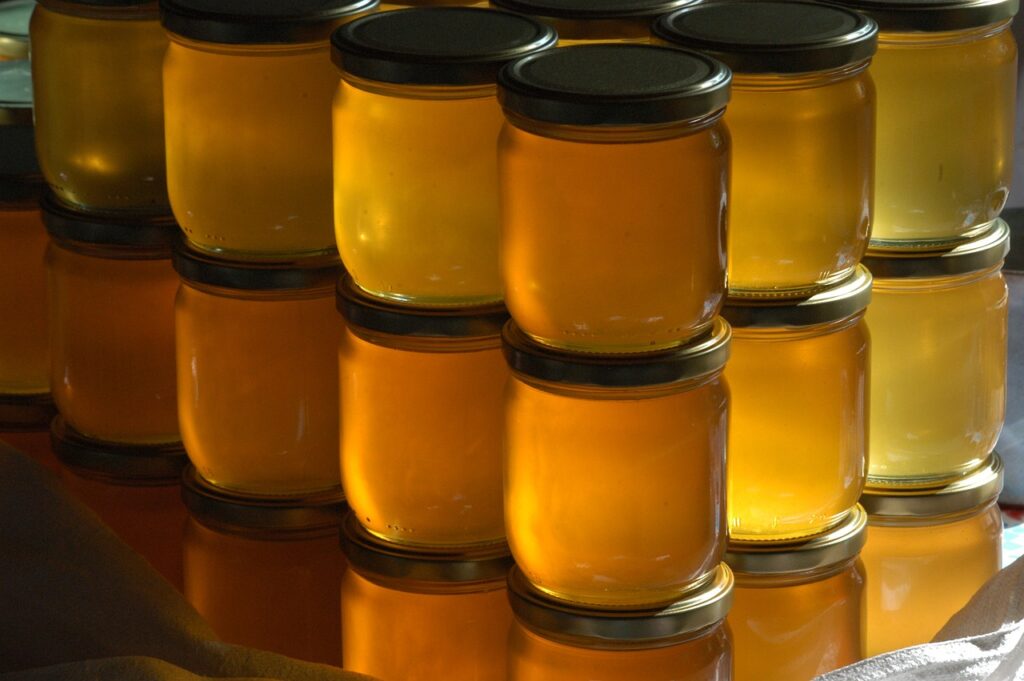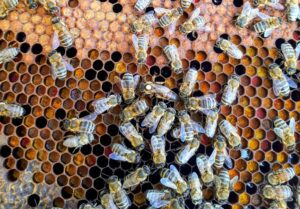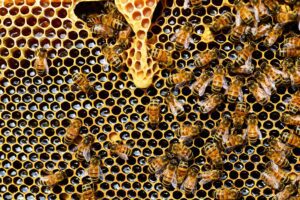Italian honey bees (Apis mellifera ligustica) are highly favored by beekeepers worldwide for their unique and beneficial traits. Renowned for their gentle temperament, exceptional productivity, strong disease resistance, and adaptability, these bees are an ideal choice for both novice and experienced beekeepers. This article explores seven compelling reasons why Italian honey bees are perfect for your beekeeping endeavors, offering insights into their behavior, strengths, and how they can enhance your apiary’s success.
Table of Contents

1. Gentle Temperament
Italian honey bees are renowned for their gentle temperament, making them an excellent choice for both beginner and experienced beekeepers. Their calm demeanor reduces the risk of stings and makes hive inspections more manageable. This trait is particularly beneficial for hobbyist beekeepers and those in urban areas where aggressive behavior could pose a problem.

Additionally, their mild nature allows beekeepers to work more confidently around the hive without the need for extensive protective gear. This can be especially helpful during routine inspections and maintenance tasks, as it minimizes the stress on both the beekeeper and the bees.
- Italian bees are less likely to sting compared to other bee species.
- Their docile nature allows for more frequent hive inspections.
- They are easier to handle, reducing beekeeper anxiety.
- Better suited for urban beekeeping due to their calm nature.
- Less need for protective gear during inspections.
2. High Productivity

Italian honey bees are known for their impressive productivity, particularly when it comes to honey production. They are diligent foragers and can efficiently gather nectar and pollen from a variety of sources. This high productivity translates to more honey and better pollination of plants.
Italian bees are also known for their longer foraging periods, which means they can collect resources over extended periods, leading to larger honey yields. Their efficient foraging behavior ensures that the hive is well-stocked with both honey and pollen, providing essential resources for the colony’s growth and survival.
- Italian bees are exceptional foragers.
- They produce large quantities of honey.
- They are effective in pollinating a wide range of plants.
- Longer foraging periods increase honey yields.
- Efficient resource collection supports colony health.
- The 19 Best Forage Plants for Bees: A Comprehensive Guide
3. Strong Disease Resistance

Italian honey bees exhibit strong resistance to many common bee diseases and parasites. This resilience helps maintain healthy hives and reduces the need for chemical treatments, which can be costly and time-consuming.
Their natural resistance to pests such as the Varroa mite and diseases like American foulbrood means that beekeepers can spend less time and money on hive maintenance and more time on productive activities. Additionally, healthier bees are more capable of withstanding environmental stresses, leading to more robust and resilient colonies that can thrive even in challenging conditions.
- Italian bees have a natural resistance to several bee diseases.
- They require fewer chemical treatments, promoting organic beekeeping.
- Healthier hives lead to more stable and productive colonies.
- Strong resistance to Varroa mites and other pests.
- Enhanced ability to withstand environmental stresses.
4. Rapid Colony Growth
One of the standout features of Italian honey bees is their ability to rapidly expand their colony. They have a high reproductive rate and can quickly build up their numbers, which is crucial for pollination and honey production. This rapid growth also helps in the recovery of colonies after winter or other setbacks.
Beekeepers can rely on the quick population increase to replace lost workers and ensure that the hive remains productive. Furthermore, rapid colony growth can be advantageous when expanding apiaries or replacing weak colonies, as Italian bees can quickly establish themselves and contribute to the overall health and productivity of the beekeeping operation.
- Italian bees have a high reproductive rate.
- Quick colony growth ensures robust pollination and honey production.
- Rapid expansion aids in colony recovery after adverse conditions.
- Supports swift replacement of lost workers.
- Facilitates apiary expansion and colony replacement.
5. Versatility in Various Climates
Italian honey bees are highly adaptable and can thrive in a range of climates. While they are particularly well-suited to warmer environments, they can also be successfully managed in temperate regions with proper care. This versatility makes them a popular choice for beekeepers in diverse geographical locations.
Winter Bee Hive Wraps: 6 Step Beginner Guide to Protect Bees
Their adaptability means that they can perform well in both rural and urban settings, providing flexibility for beekeepers regardless of their location. Furthermore, their ability to thrive in various climates helps ensure that they remain productive and healthy throughout the year, contributing to consistent honey yields and pollination services.
- Italian bees thrive in warm climates.
- They can adapt to temperate regions with appropriate management.
- Versatility makes them suitable for beekeepers in various locations.
- Perform well in both rural and urban settings.
- Consistent productivity and health across different climates.
6. Excellent Brood Rearing
Italian honey bees are known for their excellent brood rearing capabilities. They maintain large brood nests and are attentive to their young, ensuring the colony’s future generations are strong and healthy. This focus on brood rearing contributes to the overall health and longevity of the hive.
Italian bees are diligent in feeding and caring for their larvae, which results in a high survival rate for the young bees. Additionally, their strong brood-rearing behavior helps ensure that the colony can quickly rebound from population losses and maintain a stable workforce for foraging and hive maintenance.
- Italian bees maintain large and healthy brood nests.
- They are attentive to brood rearing, ensuring strong future generations.
- Effective brood rearing supports hive health and longevity.
- High survival rate for larvae due to diligent care.
- Helps the colony quickly rebound from population losses.
7. Consistent Production of Wax
Italian honey bees are proficient at producing wax, which is essential for building combs in the hive. This ability to produce wax consistently supports the structural integrity of the hive and provides ample space for storing honey and rearing brood.
The beeswax produced by Italian honey bees is of high quality and is used to construct strong, durable combs that can withstand the rigors of daily hive activity. Consistent wax production also allows beekeepers to harvest and use beeswax for various products, such as candles and cosmetics, adding an additional revenue stream to their beekeeping operations.
- Italian bees produce wax consistently, ensuring stable comb structures.
- Ample wax production supports honey storage and brood rearing.
- Strong combs enhance the overall functionality of the hive.
- High-quality beeswax suitable for various products.
- Provides additional revenue opportunities for beekeepers.
Bonus: Italian Honey Bee Queens

The queen bee plays a pivotal role in the health and productivity of an Italian honey bee colony. Italian honey bee queens (Apis mellifera ligustica) are highly valued for their exceptional egg-laying capacity and the strong, healthy colonies they help maintain. Understanding the characteristics and behavior of Italian honey bee queens can provide valuable insights into their contributions to the hive’s success.
Exceptional Egg-Laying Capacity
Italian honey bee queens are renowned for their prolific egg-laying abilities. A single queen can lay up to 2,000 eggs per day during peak breeding seasons, ensuring a steady supply of worker bees to support the hive’s activities. This high reproductive rate is essential for maintaining a robust colony, especially during the spring and summer when the demand for foragers and hive maintenance workers is greatest.
- Lay up to 2,000 eggs per day.
- Ensures a continuous supply of worker bees.
- Supports hive growth and productivity during peak seasons.
Long Lifespan and Productivity
The lifespan of an Italian honey bee queen can range from one to five years, with most queens remaining productive for about two to three years. During her lifetime, the queen’s primary role is to lay eggs and produce pheromones that maintain colony cohesion and regulate the behavior of the worker bees. Her longevity and sustained productivity are key factors in the stability and success of the hive.
- Queens can live between one to five years.
- Most productive for two to three years.
- Produces pheromones that regulate colony behavior.
- Successfully Introducing a New Queen – 12 Key Strategies
Gentle and Manageable
Like the worker bees, Italian honey bee queens exhibit a gentle disposition, which is beneficial for beekeepers. Their calm nature makes hive management easier and reduces the likelihood of aggressive behavior spreading through the colony. This trait is particularly advantageous during queen replacement or hive inspections, as it minimizes stress on the bees and the beekeeper.
- Gentle and calm disposition.
- Easier to manage during hive inspections.
- Reduces aggressive behavior in the colony.
- Locating the Queen Bee – 10 Proven Tips for Beekeepers
Genetic Influence on Colony Traits
The genetic makeup of the queen significantly influences the overall traits of the colony. Italian honey bee queens pass on their desirable characteristics, such as gentle temperament, high productivity, and disease resistance, to their offspring. This genetic transmission ensures that the beneficial traits of Italian honey bees are consistently present in the colony, contributing to its long-term success.
- Passes on desirable traits to offspring.
- Ensures consistent colony characteristics.
- Contributes to long-term hive success.
Importance of Queen Health and Quality
Maintaining the health and quality of the queen is crucial for the colony’s success. A healthy queen lays a high number of eggs and produces strong pheromones that keep the worker bees motivated and organized. Regular monitoring and timely replacement of aging or failing queens help ensure the continued vitality and productivity of the hive.
- Ensures continued hive vitality and productivity.
- Healthy queens lay more eggs and produce strong pheromones.
- Regular monitoring and timely replacement are essential.
Additional Resources
USDA PROGRAMS AND RESOURCES TO SUPPORT BEEKEEPERS
Conclusion
Italian honey bees (Apis mellifera ligustica) offer numerous advantages that make them ideal for beekeeping. Their gentle temperament, high productivity, strong disease resistance, rapid colony growth, versatility in various climates, excellent brood rearing, and consistent wax production contribute to their popularity among beekeepers.
These traits ensure that Italian honey bees are a valuable asset to any apiary, providing benefits that enhance both honey production and pollination services. Whether you are a hobbyist or a commercial beekeeper, Italian honey bees can significantly contribute to the success and sustainability of your beekeeping endeavors.



